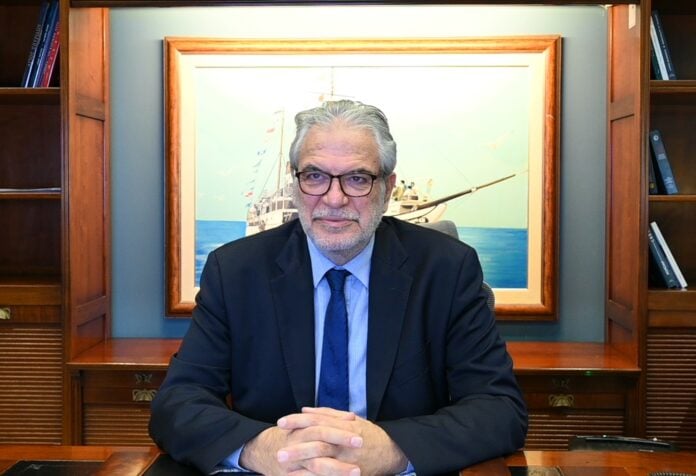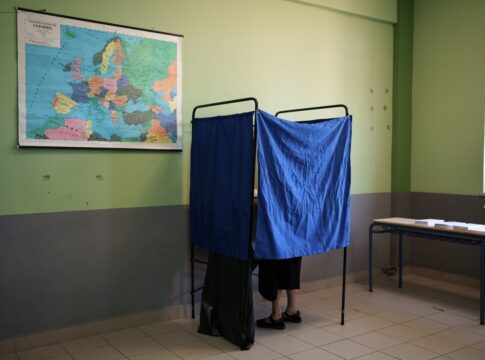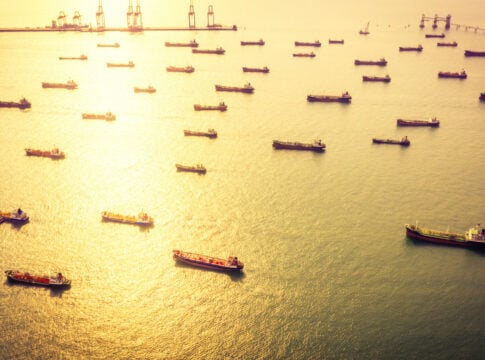Minister of Maritime Affairs and Insular Policy Christos Stylianidis outlined in an interview with “Naftemporiki” three plus one principles for reaching an agreement at the level of the International Maritime Organization (IMO) regarding carbon pricing.
The minister stressed the importance of fair competition. The global shipping carbon pricing system should be simple, he stated, based on the principle that the polluter must pay during the supply of the ships.
One of the most pressing issues facing Greek and global shipping is the green transition and the regulatory framework. Despite the decisions made last summer by the International Maritime Organization, there are still open issues, such as the establishment of a global carbon pricing system. Do you think that by 2027, the necessary consensus will be reached to adopt an effective global measure?
“We must all support the IMO’s work – in this case the IMO’s 2023 Strategy to reduce greenhouse gases from ships. This is the only way to ensure a level playing field, through global measures.
It is positive that, during the specialization of the medium-term measures for the implementation of the Strategy, there is an agreement regarding the necessity of combining a technical measure (in the form of a global fuel standard) with a market-oriented measure, similar to what is called carbon pricing system.
I believe that it is possible to adopt a global carbon pricing system that will be implemented in early 2027. Of course, in order to do this, the relevant negotiations should be concluded, if possible before the end 2025. To get there, technical discussions will start as early as next autumn.
Like any difficult negotiation, the one concerning the global carbon pricing system requires negotiating flexibility. Otherwise the very role of the IMO is undermined. At the moment there are various proposals on the table and all parties involved should show a positive attitude in order to achieve the necessary convergences.”
Greece is in favor of fair competition. But are there any specific positions supported by Greece?
“First of all, I must tell you that all international measures, such as the measure on carbon pricing, must be simple in order to be implemented effectively. Complex measures are difficult to implement and often leave room for complacency.
The second point, which we insist on, is to respect the fundamental principle ‘the polluter pays.’ The third point concerns the funds that will be collected. We argue that a large part should be channeled into the great effort to disengage shipping from carbon fuels, to produce and subsidize clean fuels.
These are the basic principles. At the same time, our country has for many years considered that the measure that meets the criteria should be collected, if possible, when supplying the ship with fuel.
Now there are other variations that have been proposed by different countries. We are ready to evaluate all proposals, as long as they meet the basic principles we have set.
Let me emphasize something else. Another extremely important aspect of the new IMO 2023 Strategy. It concerns the goal of using zero or low greenhouse gas emission technologies, or energy sources that will represent at least 5%, striving for 10%, of the total energy used by international shipping by 2030. We strongly supported this so as to become a springboard for the availability of clean fuels for shipping.”
Speaking of the IMO, how easy was it to maintain the lead, considering the generally volatile environment internationally?
“Our leading role within the IMO, but also our role in Europe is what created the conditions so that we remain in first place.
Greece’s first place in the IMO elections is a significant success both from a maritime and a diplomatic point of view. To this end, the Ministries of Shipping and Foreign Affairs worked together harmoniously, and with a proper distribution of forces, for the promotion of our candidacy.
Despite the fact that the last elections took place in a volatile and difficult environment due to geopolitical developments and the grouping of some countries, Greece relied on the global primacy of its shipping, especially on the fact that it is one of the most reliable partners in the IMO, with an unwavering trust in the Organization’s global regulatory role and in promoting realistic solutions for global shipping. In this way we managed to capitalize on the trust of almost all the member states.”














